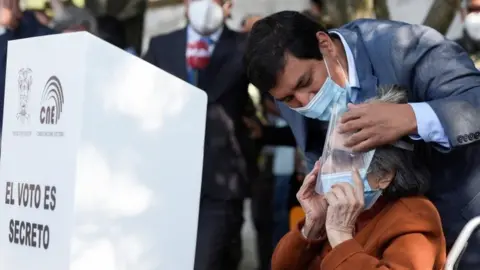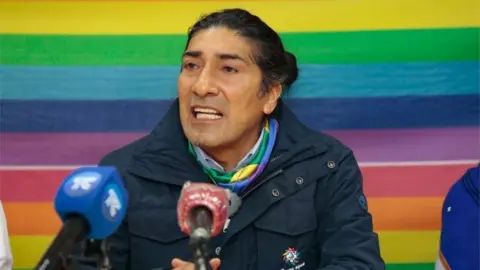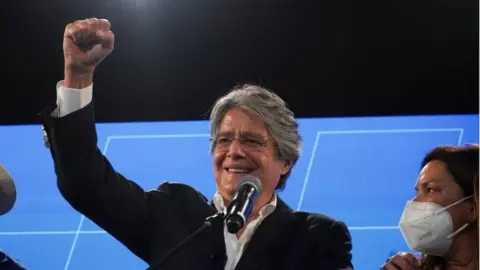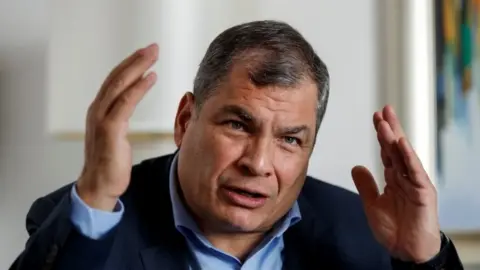Ecuador election goes into run-off with Arauz in the lead
 Reuters
ReutersLeft-wing economist Andrés Arauz has won the first round of Ecuador's presidential election with about 32% of the vote - not enough for an outright victory, preliminary results show.
The run-off is scheduled for 11 April.
It is not clear at this point whom Mr Arauz will face in the second round as indigenous leader Yaku Pérez and conservative banker Guillermo Lasso are neck-and-neck.
With about 95% of vote counted, they were drawn with 19.7% each.
Full officials results of Sunday's election are expected to take days, especially as the candidates are likely to demand a manual recount.
Twists and turns
While 36-year-old Mr Arauz had a clear lead from early on in the count, the race between Mr Lasso and Mr Pérez continues to be a nail-biter.
 EPA
EPAFirst, Mr Lasso looked set to join Mr Arauz in the second round, then he was overtaken by the indigenous candidate - only for the vote difference between them to dwindle to a draw in the early hours of Monday.
Mr Pérez said he and his followers would hold "a vigil" outside the election council's headquarters in Quito to prevent vote manipulation.
"We've come... to defend the will of the vast majority of Ecuadoreans who see hope for a change," he said.
Mr Lasso, who is running for president for the third time, was also confident of making it into the second round. He held a celebratory rally in his power base of Guayaquil, where supporters shouted "Lasso president".
 Reuters
ReutersMr Arauz was in a celebratory mood, too, saying he had won "big" even though he fell short of the 40% of votes he would have needed to win outright in the first round.
The eventual winner of the election will replace the outgoing president, the embattled centrist Lenín Moreno.
What do the candidates stand for?
With the economy contracting and unemployment doubling in the first nine months of 2020, many Ecuadoreans said ahead of the election that they were more preoccupied with day-to-day survival than with politics.
Not surprisingly, candidates focussed in their campaigns on how to kick-start the economy and help workers and the hundreds of thousands who have lost their jobs during the coronavirus pandemic.
Mr Arauz promised to increase financial aid and public spending to rekindle economic growth, pledging to give $1,000 (£733) each to one million female heads of household, while providing $3bn to local governments, and subsidies and credits for the public sector.
Given Ecuador's already high indebtedness and the recession caused by the coronavirus, some analysts have questioned whether such proposals are feasible.

You may also be interested in:

Many also wonder how Mr Arauz would handle Ecuador's relationship with the International Monetary Fund (IMF), which had recommended austerity measures and spending cuts before the pandemic struck.
Mr Pérez, 51, surprised many by the high percentage of votes he won. If successful, he would be the first indigenous president in a country where fewer than 10% of the population identify as indigenous.
He campaigned on a promise of banning mining activity in the country's highlands and setting limits on new concessions for oil production.
He told Americas Quarterly magazine that he is "from the ecological left that defends the rights of people and nature and understands indigenous communities".
Guillermo Lasso, 65, a banker-turned-politician, has said he will attract increased foreign investment to Ecuador and increase oil production.
He said he would create two million new jobs, an ambitious promise in a country of 17 million.
The long shadow of Correa
Rafael Correa, who governed Ecuador from 2007 to 2017, did not stand in the election and yet his influence was key.
 EPA
EPAThe former leader was sentenced last year in absentia for corruption, and is banned from any political role for 25 years.
But Mr Arauz is his protégé, and many see Mr Correa again playing a key role if Mr Arauz wins.
Mr Arauz has made no secret of his political relationship with the ex-leader. He told local media that if he was elected president, Mr Correa would be "his most trusted adviser".
